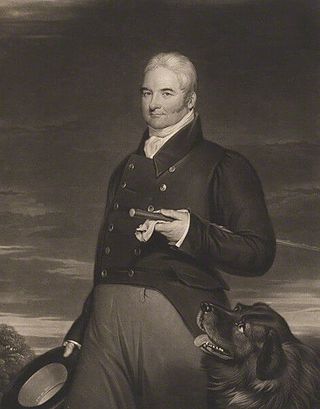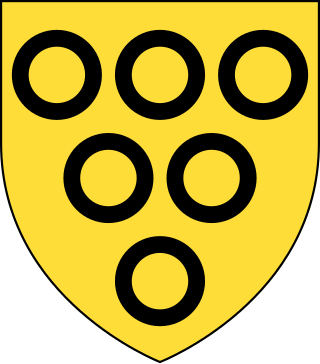
Earl of Kimberley, of Kimberley in the County of Norfolk, is a title in the Peerage of the United Kingdom. It was created in 1866 for the prominent Liberal politician John Wodehouse, 3rd Baron Wodehouse. During his long political career, he notably held office as Lord Lieutenant of Ireland, Secretary of State for the Colonies, Secretary of State for India and Secretary of State for Foreign Affairs. He was succeeded by his son, the second Earl. At first a Liberal like his father, he later joined the Labour Party, becoming the first Labour member of the House of Lords. His eldest son, the third Earl, represented Norfolk Mid in the House of Commons as a Liberal. Since 2002, the titles are held by the latter's grandson, the fifth Earl.

Baron Hotham, of South Dalton in the County of York, is a title in the Peerage of Ireland. It was created in 1797 for the naval commander Admiral William Hotham, with remainder to the heirs male of his father. Hotham was the third son of Sir Beaumont Hotham, 7th Baronet, of Scorborough, and in 1811 he also succeeded his nephew as eleventh Baronet. Lord Hotham never married and on his death in 1813 he was succeeded in both titles by his younger brother Beaumont, the second Baron and twelfth Baronet. He had previously represented Wigan in the House of Commons.

There have been six baronetcies created for persons with the surname Smyth, two in the Baronetage of England, one in the Baronetage of Great Britain, one in the Baronetage of Ireland and two in the Baronetage of the United Kingdom. One creation is extant as of 2010.

There have been twenty one baronetcies created for persons with the surname Williams, eight in the Baronetage of England, three in the Baronetage of Great Britain and ten in the Baronetage of the United Kingdom. Only six of the creations are extant as of 2017.
There have been three baronetcies created for persons with the surname Everard, one in the Baronetage of Ireland, one in the Baronetage of England and one in the Baronetage of the United Kingdom. Only one creation is extant as of 2010.
There have been six baronetcies created for persons with the surname Thomas, three in the Baronetage of England, one in the Baronetage of Great Britain and two in the Baronetage of the United Kingdom. Two of the creations are extant as of 2016.
There have been four baronetcies created for members of the Thorold family of Lincolnshire, two in the Baronetage of England and two in the Baronetage of Great Britain. As of 2014 one creation is extant.

There have been two baronetcies created for persons with the surname Goring, both in the Baronetage of England. The second creation came into the family through a special remainder in the patent creating the baronetcy. Only the latter creation is extant as of 2008.

The Dyke Baronetcy, of Horeham in the County of Sussex, is a title in the Baronetage of England. It was created on 3 March 1677 for Thomas Dyke, Commissioner of Public Accounts and Member of Parliament for Sussex and East Grinstead. The 2nd Baronet married Anne Hart, daughter and heiress of Percival Hart. In 1836 the 5th Baronet unsuccessfully claimed the barony of Braye, of which peerage he was a co-heir through the Hart family. The 7th Baronet was a successful Conservative politician. Percyvall Hart Dyke (1872–1952), grandson of Reverend Thomas Hart Dyke, second son of the 5th Baronet, was a Colonel in the Indian Army. His son Trevor Hart Dyke was a Brigadier in the Queen's Royal Regiment. David Hart Dyke, son of Reverend Eric Hart Dyke, son of the aforementioned Colonel Percyvall Hart Dyke, is a retired Captain in the Royal Navy and commanded HMS Coventry during the Falklands War. His daughter Miranda Hart is a well known writer, comedian, and actress.
Anne Hoby was an English heiress.

The Elwes Baronetcy of Stoke-by-Clare in the County of Suffolk, was a title in the Baronetage of England held by the Elwys family, whose name through the years has alternately been spelled Helwish, Helewise, Helwys, Elwaiss and Elwaies.
There have been five baronetcies created for persons with the surname Wentworth, four in the Baronetage of England and one in the Baronetage of Great Britain. All creations are extinct.
Sir John Meux, 1st Baronet was an English politician who sat in the House of Commons from 1640 to 1643. He supported the Royalist cause in the English Civil War.
There have been two baronetcies created for members of the Hussey family, both in the Baronetage of England. Both creations are extinct.
Thomas Hoby JP DL of Bisham Abbey, Berkshire and Breamore, Hampshire, was an English politician.

Sir Robert Dashwood, 1st Baronet (1662–1734) was an English politician.

Sir Henry Meux, 1st Baronet was a British brewer, owner of the London brewery which became the Meux Brewery.

The Lowther baronetcy, of Whitehaven in the County of Cumberland, was created in the Baronetage of England on 11 June 1642 for Christopher Lowther; he was the younger brother of Sir John Lowther, 1st Baronet, of Lowther.

The Barrington Baronetcy, of Barrington Hall in the County of Essex was created in the Baronetage of England on 29 June 1611, for Francis Barrington, member of parliament (MP) for Essex.

The Meux baronetcy, of Theobald's Park in the County of Hertford, was created in the Baronetage of the United Kingdom on 30 September 1831 for Henry Meux, head of Meux's Brewery. There was a family connection to the Meux baronets of Kingston (1641).












